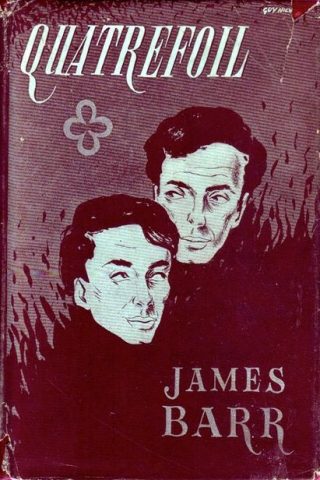 Quatrefoil
Quatrefoil
by James Barr
Published by Greenberg
Published 1950
Fiction (romance)
373 pgs. • Find on Amazon.com
Reviewed by Stephen O. Murray
March 31, 1995.
For me, the most interesting aspects of Quatrefoil, first published in 1950 under the pseudonym James Barr by James Fugaté (1922–95), are the refusal by its characters of any link to any gay society. For them, as for the couples in Cast the First Stone and Giovanni’s Room, forbidden love all the more splendid as isolation à deux standing in contrast with sinks of depravity.
Tim Danelaw tells his fellow naval officer Phillip Froelich: “Never to identify yourself with any group. One of your great temptations will be to find companions and solace” (350). And a number of people, who accept that Phillip is right to surrender to Tim’s love (and have known all along that he is “that way” and have been trying to prepare him—even his dense Bible-belt father, at least unconsciously), urge him to keep apart from the homosexual crowd.
The stilted neo-Greek philosophizing (filtered, I think, through a typically American reading of Nietzsche) about love between strong, silent warriors seems interminable (what happened to Tim’s view that “anyone attempting to explain or justify it, was, in addition to being a coward, defeated before he began” (194)?).
Rather than a novel, Quatrefoil seems a manual on how and why to keep same-sex love hidden and to appear to honor social conventions (keeping “private life” invisible, at least from the general public: “Your first duty [is] to society” (323)). Tim can die happy, but happy fags could not live in the novels of that era, especially not after having found a masculine beloved and shaping him. So Tim’s plane crashes—and Phillip doesn’t kill himself.
Although it’s schematic, there’s a lot more about mentorship than about love (the sex is quite inexplicit). What seems most skillful is the plot(s) with enemies in the navy and back in Devereux, Oklahoma to manage.
 In Playing the Game, Roger Austen considered that Quatrefoil’s “two thoughtful, masculine heroes provided a corrective to the many mindless, pathetic or flighty gay characters of the forties. Quatrefoil is one of the earliest [American] novels that could have produced a glow of gay pride.”
In Playing the Game, Roger Austen considered that Quatrefoil’s “two thoughtful, masculine heroes provided a corrective to the many mindless, pathetic or flighty gay characters of the forties. Quatrefoil is one of the earliest [American] novels that could have produced a glow of gay pride.”
The book was is based on Fugaté’s experience in the U.S. Navy during World War II (he had enlisted in 1942) and on a fraternity brother with whom Fugaté had sex as a university student after the war.
I found a 1991 Advocate feature on James Barr Fugaté in which he says, “I learned the importance of telling everyone else what they wanted to hear and keeping the truth to myself” and the afterword from then that details that Quatrefoil is an imagination of a happier ending for a former frat-brother suck-buddy who was ground down by his father back in Oklahoma after wartime naval service.
Note: The original ONE Library retained five copies of Quatrefoil: accession numbers 206, 998, 1104, 1150, and 1151.
31 March 1995
©2005, 2016, Stephen O. Murray

